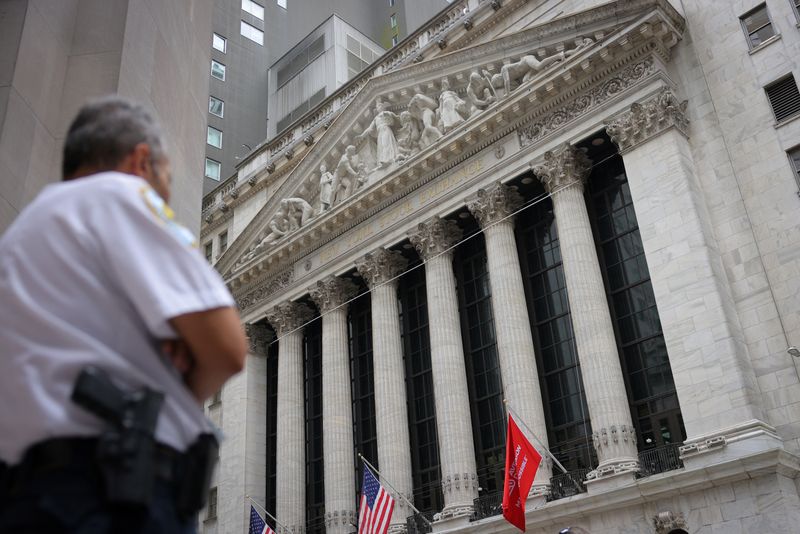By Jamie McGeever
ORLANDO, Florida (Reuters) -FOMO and TINA are two English-language acronyms that have become common parlance in financial markets. Together, they help explain the relentless rise of U.S. equities – a trend that now should probably be raising red flags.
Investors’ “fear of missing out” (FOMO) on a two-year bull run has helped the S&P 500 hit 47 record highs this year. And this momentum shows few signs of waning because if investors want equity exposure, “there is no alternative” (TINA) to the United States, at least not if the relative strength of U.S. economic data and corporate profits is your guide.
In many ways, the latter trend is feeding the former, and the symbiotic relationship between the two only seems to be getting stronger.
IT’S ALL RELATIVE
The S&P 500 and Nasdaq are both up more than 20% this year, compared to 16% for Japan’s Nikkei, 14% for Chinese blue chips and Asian stocks ex-Japan, 10% for euro zone stocks, and 8% for Britain’s FTSE 100.
Wall Street’s outperformance has, of course, been flattered by a handful of Big Tech names: the FAANG index is up a whopping 34% this year. But the equal-weighted S&P 500’s year-to-date gains of 15% are still better than investors are getting almost anywhere else.
While these lopsided returns might suggest U.S. equities are “overbought”, the underlying fundamentals suggest otherwise. The Atlanta Fed’s GDPNow model is currently projecting third quarter annualized growth of 3.4%, the highest since the model’s initial estimate in July.
Corporate America also boasts a very positive outlook. While earnings growth is only expected to be around 5% in the third quarter, this figure is expected to bounce back well into double figures in the coming quarters and settle around 15% for 2025 overall, according to LSEG I/B/E/S estimates.
Little wonder Goldman Sachs’ equity strategists reckon the S&P 500 is on course to reach 6000 points by the end of the year. It could even reach 6270 if markets see a replication of historical October-December election year patterns, they add.
Meanwhile, Germany – the largest economy in Europe and fourth largest in the world – is flirting with its second consecutive annual contraction, something the advanced manufacturing hub hasn’t seen in over 20 years.
China – the world’s second-largest economy – is in the midst of a major property crisis and flirting with deflation. This has prompted an unprecedented policy response from Beijing that many experts still don’t think will be enough to get the economy firing on all cylinders.
Then there’s Japan, which appears to be so concerned about stalling its economy and spooking investors that it’s hesitant to raise interest rates by more than a few basis points.
Foreign investors have clearly taken notice: their share of the entire U.S. equity market is now a record 18%, Goldman Sachs figures show.
BLOATED AND EXPENSIVE
Is the U.S. stock market morphing into a mirror image of the U.S. bond market? Parallels are emerging: they are both the most liquid markets in their respective asset classes; they offer investors the ‘safest’ securities; and they dwarf all rivals by a considerable distance.
Indeed, Wall Street has been a veritable money machine for investors this year, especially the mega caps sitting on huge cash piles and boasting credit ratings comparable to those of the federal government.
It’s therefore unsurprising that the U.S. share of the global equity market cap has climbed to a record high 72%. Who wouldn’t want a slice of that pie?
This level of concentration cannot last forever, so investors should be wary of buying U.S. equities at current levels, right?
Maybe, but maybe not.
True, U.S. stocks are the most expensive in the developed world by some distance, based on long-term valuations measured by Robert Shiller’s cyclically adjusted price-to-earnings (CAPE), and are more expensive than they have been relative to global stocks for more than two decades.
But, worryingly for U.S. bears, investors are unlikely to dramatically reallocate any time soon. “Institutional investors are getting forced into the market right now given ‘FOMU’: fear of materially underperforming benchmark equity indices,” Goldman’s Scott Rubner wrote this week, providing investors with yet another acronym.
And bull markets that celebrate their second birthday have historically tended to last multiple years thereafter, Ryan Detrick at Carson Group has found.
So U.S. bears might be correct that equity markets will eventually mean revert, but these investors risk underperforming and losing clients long before that happens.
(The opinions expressed here are those of the author, a columnist for Reuters.)
(By Jamie McGeeverEditing by Christina Fincher)

